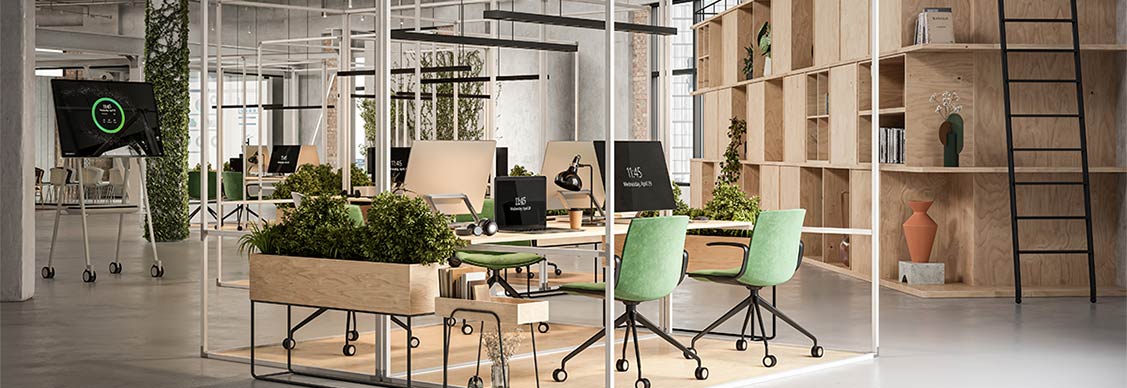Hybrid work: balancing office and remote environments for business success
How businesses are leveraging hybrid working solutions to attract talent, reduce costs, and boost productivity
The global COVID-19 pandemic has significantly reshaped how we work, with one of its most enduring impacts being the widespread adoption of hybrid working models. As businesses navigate the post-pandemic landscape, the compelling case for hybrid office solutions continues to grow stronger, promising benefits for employers and employees.
According to JLL's biannual future of work survey, most businesses (56%) now favour a hybrid solution, while 44% advocate for a full-time return to the office. Notably, "hybrid adopters" are more likely to be large organisations with 10,000+ employees, particularly in e-commerce, energy and renewables, technology, and life sciences sectors. These knowledge-based industries recognise hybrid workstyles as a key component of their employee value proposition, which is crucial for attracting and retaining top talent.
Benefits for businesses
The appeal of hybrid workspace solutions lies in their ability to create a "win-win" scenario, offering significant and quantifiable benefits to businesses and employees. For companies, two primary advantages stand out:
Enhanced talent attraction and retention: Creating work environments that appeal to key talent has become a primary objective for Corporate Real Estate (CRE) teams across the MENA region and beyond. Hybrid models allow businesses to offer a range of working environments, catering to different staff preferences and activities. This flexibility is increasingly seen as a crucial component of an inclusive working environment.
Cost reduction: While secondary to talent management, controlling costs remains important for many CRE teams. Hybrid strategies can reduce the size of the corporate footprint, allowing businesses to invest more per square meter in creating high-impact offices that impress clients and staff.
Advantages for employees
For employees, the benefits of hybrid working are equally compelling:
Flexibility and inclusivity: Hybrid models create environments capable of accommodating various activities and working styles. This inclusivity extends to staff with disabilities or special needs and those residing in remote areas, allowing businesses to appeal to a wider range of potential employees.
Improved work-life balance: Hybrid work offers significant benefits across various demographics and life situations. Gen Z employees enjoy flexibility for personal pursuits and travel. Those involved in elderly care can better manage caregiving responsibilities alongside work commitments. New mothers benefit from easier transitions back to work and more convenient childcare arrangements. Families enjoy increased time together, contributing to an improved work-life balance.
Enhanced well-being: Personal well-being is boosted through more time for self-care, reduced stress, and improved sleep patterns, all of which contribute to increased productivity.
Societal benefits
Beyond the immediate benefits to businesses and employees, hybrid solutions also offer advantages to wider society. By reducing commuting and travel compared to traditional office-based models, hybrid working contributes to lowering carbon emissions – a key objective for many cities across the Middle East and beyond. This aligns with the goal of creating more livable and sustainable urban environments.
Diverse hybrid solutions
It's important to note that there is no single "one size fits all" solution for hybrid working. JLL's research shows that corporates are adopting various options, with 23% of survey respondents offering employees the option of working from home without a fixed ratio. This flexibility allows businesses to adapt quickly and cost-effectively to changing demands and employee preferences.
Moreover, hybrid solutions are not limited to working from home. An increasing amount of "office-based activities" are now being undertaken in neither the corporate office nor the employee's home office. The serviced office sector across the MENA region will likely continue growing over the next few years, offering a range of spaces from cost-effective back offices to more exclusive solutions for client-facing activities. Premium office projects, such as One Offices in One Jaazeeb and ICD Brookfield Place in Dubai, are leading this trend by offering high-quality shared spaces to tenants seeking to implement hybrid workplace strategies.
Looking ahead, hybrid solutions are set to become an increasingly integral component of the future of office work. While 43% of respondents to JLL's latest global CRE survey expect the number of days their staff work in the office to increase by 2030, this will be within a hybrid work strategy for most organisations. Relatively few companies expect staff to work entirely from their corporate offices.
As the workplace continues to evolve, a range of alternative hybrid working solutions is likely to emerge. Each company will need to develop its own strategy, tailored to its unique needs and culture. The most successful companies will be those that can design and implement hybrid workplace frameworks that create a healthy balance between the corporate office, employees' homes, and other environments.
The compelling case for hybrid working is clear. By offering significant benefits to both businesses and employees, hybrid models are reshaping the future of work. As organisations strive to attract and retain top talent, reduce costs, and boost productivity, embracing hybrid solutions will be key to staying competitive in the rapidly changing business landscape. The future of work is hybrid, and those who adapt effectively will be best positioned for success in the years to come.
At JLL, we create inspiring spaces that enhance experiences and deliver long-term value through creativity, innovation, and global expertise. Our Design team will be at the Workspace Summit in the Dubai World Trade Centre from May 27-29. Come meet them to discuss how we can help you create exceptional workspaces or attend Farah Addada’s insightful panel discussion on "Data-driven workspaces: how smart analytics are shaping the future of work".
